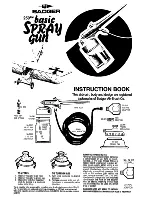
9E
5) Remove the three bolts attaching the piston cylinder to the bottom of
the tank (Figure 4).
6) Reach in through the tank fill opening and remove the piston cylinder.
7) Remove check valve cartridge assembly from bottom of piston cylinder
utilizing pump handle clip (clip has flat blade incorporated into end). Place
flat blade into slot in bottom of cartridge and unscrew (Figure 5 and 6).
8) Once cartridge has been removed it can either be replaced as an
assembly or rebuilt.
9) To rebuild disassemble two halves of cartridge and replace seal and/
or ball. Replace cartridge (Figure 7). The seal mounts inside the larger of
the two halves of the cartridge. The seal counterbore side mounts into the
grooves in the cartridge halve. Pump performance my be affected if this is
not assembled correctly.
10) At this point the piston cylinder itself and/or piston cylinder stud gaskets
can be replaced. The piston cylinder stud gaskets must be oriented correctly
or leakage may result (Figure 8).
11) Reassemble piston cylinder using washers and bolts on the underside of
the base.
12) Replace pump assembly into tank and into the piston cylinder which is
mounted on the bottom of the tank (see important notes regarding gasket
and felt washer in Pump and Disassembly and Rebuild section). Be careful
not to damage the plunger seal as it seats into the piston cylinder. It is
recommended that you look through the tank fill opening while performing
this to achieve better alignment. If necessary you can also reach in and use
your hand to guide the plunger seal into the piston cylinder.
13) Position the pump outlet (hose connection) in the desired position.
Tighten the pump retaining ring onto the tank.
14) Reach into tank fill opening and attach agitator to pressure chamber
body.
15) Connect linkage arm to the top of the pump assembly (see section
covering Installing the Pump Handle)
Figure 5
Piston Cylinder
Figure 4
Check Valve
Flat side
Seal
Ball
Counterbore Side
Figure 6
Figure 7
Stud Gaskets
Figure 8











































